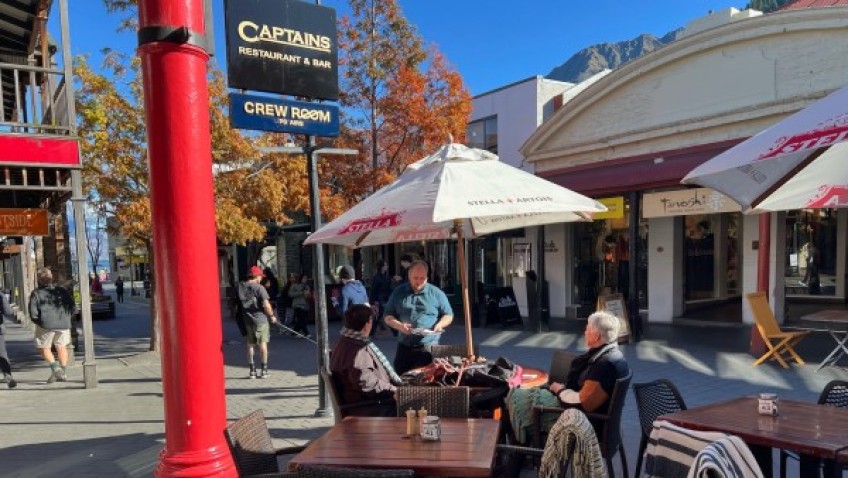Costs killing outdoor dining in Queenstown Lakes: Hospo NZ

You’d be hard pressed to find a more stunning location than Queenstown. The town’s striking scenery, punctuated by mountain ranges and Lake Wakatipu, has been attracting visitors from here and abroad for generations.
Many of these visitors have joined locals in admiring the views from one of the many hospitality venues that are dotted around Queenstown, enjoying world-class food and beverages as they dine outdoors.
Alfresco dining offers more than good food, drink and matching views, though. It lifts the vibrancy of a town centre, building and promoting a safer environment, with extra lighting, extra late-night activities and extra people around enjoying the buzz of a vibrant town centre.
Hospitality NZ wholeheartedly supports outdoor dining across the motu. We advocate with councils up and down the country, including in Queenstown, to encourage outdoor dining by creating conditions in which it can flourish.
The future of the time-honoured tradition of outdoor dining in Queenstown is under strain though, following Queenstown Lakes District Council’s recent decision to raise the price of permitting for outdoor dining.
Earlier this year, QLDC opened consultation on its Outdoor Dining on Public Places Policy 2024 – the guidelines for how outdoor dining is administered and charged for. Amongst other feedback, Hospitality NZ requested that a schedule of proposed licence fees should be included in the document to allow for objectivity and transparency.
Fees associated with the updated policy weren’t shared until the policy was finalised. Some of the prices rises Queenstown hospitality businesses are now facing as a result are eye-watering. Our members are reporting rises in the vicinity of 200 to 300 percent. Rather than a phased approach, hospitality businesses are getting an almighty shock as they renew their licences.
This policy outlines some of the previously-mentioned benefits of outdoor dining in its introduction. It also rightly points out that public spaces give restaurant, café, and bar owners a chance to expand their businesses and attract more customers by being more visible.
This is a real benefit for hospitality business, and one that should be paid for. No one is arguing against paying a fair charge to use public space that is maintained through ratepayer funding. The reality of these benefits has been hugely inflated though in QLDC’s decision to increase fees for hospitality operators using public spaces.
These steep, and frankly unjustifiable rises in fees, come at a time they can ill afford it. QLDC’s Revenue and Funding Policy aims to get the highest possible return from its assets and notes that licenses can be an important source of income. Councils need to balance what’s good for the community with making money, but in this case, it seems making money has taken priority.
QLDC has set its outdoor rental rate at 30 percent the indoor rental, leading to outdoor dining charges ranging from $600 per square metre in the Queenstown Mall to $250 per square metre elsewhere in the town centre.
These figures have been reached by assessing indoor rental rates of commercial properties in defined neighbourhoods – not just hospitality businesses, but all businesses. Since global retailers likely pay higher rents, the resulting figures are more than many hospitality businesses can afford while staying profitable.
Elsewhere in New Zealand, councils take a more balanced approach. In Tauranga, a 100 percent discount is in place until December 31, 2024. When the local council starts charging in the New Year, rates will range from $8 to $30 per square metre depending on location – an 80 percent discount on the normal rates.

Alfresco dining is under strain in Queenstown Lakes, Hospitality NZ boss Steve Armitage argues (Image: Supplied).
In Christchurch, outdoor dining licenses are 30 percent of the prime rental rate for up to 30 square metres, as is the case in Queenstown, with a sliding scale for larger spaces. With a considerably lower per square metre rental rate though, the actual cost to businesses is far lower than in Queenstown.
Hospitality businesses were hit hard during the Covid-19 pandemic, and have continued to be impacted by the current economic climate. QLDC’s decision to raise fees adds to the existing financial pressures the hospitality sector is facing, and will be another blow some operators won’t be able to recover from.
We realise hospitality isn’t the only industry impacted by financial pressures, but in this case the increased charges are targeted at hospitality businesses. Queenstown is one of New Zealand’s tourism hotspots, but it’s not immune to seasonal fluctuations. These fee increases could exacerbate struggles during off-peak seasons, where businesses rely on steady cash flow.
The need to generate revenue highlights an ongoing issue around sustainable funding for local governments for tourism, and industries that benefit from it such as hospitality. Relying solely on general rates places undue pressure on ratepayers. But QLDC’s approach to fill the shortfall is not viable for hospitality businesses, which operate with tight margins.
Our members have suggested alternatives. One idea is for hospitality businesses to pay 30 percent of their indoor rent per square metre, based on the size of the outdoor area and proof of what they pay in rent. Another option is to seek an independent valuation that only looks at hospitality rents in the area, and apply 30 percent of that rate to outdoor spaces used by these businesses.
Without a pragmatic solution to the inequitable system introduced by QLDC, there will be unintended consequences. Will prices for outdoor dining need to increase? Could fewer businesses offer outdoor seating? How might this affect Queenstown’s character as a tourist destination?
Operators may be forced to consider these questions unless QLDC can return to the table with a more measured approach which balances community benefits with financial return.
QLDC response
QLDC appreciates the offer to respond. Based on feedback we have received since the policy was adopted by councillors in May, the views expressed in the column are not universally shared by our 51 local outdoor dining licence holders. We maintain an open-door policy for direct, collaborative discussions with them. This continues to be based around how licence holders can develop and improve their business offerings. In Queenstown, we welcome how many are responding to council’s investment in the town centre upgrades by reinvesting in items like new signage, umbrellas and furniture as well as their actual premises. It’s also encouraging to see new applications for using public spaces for outdoor dining as well as the expansion of existing offerings. Whilst public consultation on the policy did not include actual fees, it clearly outlined the move to market rentals calculated using the industry standard as in other centres like Christchurch. An independent valuer has confirmed there’s no difference in prime rental rates based on the use of the building. In other words, retail and hospitality businesses in similar locations pay the same rental rate. At their meeting on 2 May, councillors voted unanimously to adopt the proposals for rentals at market rates assessed by an independent valuer. These rentals were publicly available to view in the paper that was presented as part of the agenda items in advance of the council meeting.
Read more: QLDC locals in 'prescriptive' rules for footpath dining
Main image: A policy refresh by the council has seen fees to bars, restaurants and cafes for outdoor tables and chairs jump in the Queenstown Lakes District.

























